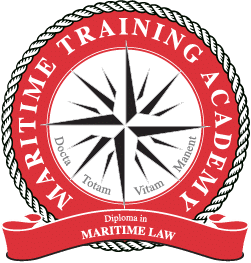Maritime Law Course
Online Maritime Law Training
This course encapsulates a number of marine law concepts from arrest of ships to yacht insurance. It is not designed to be an academic text for practitioners, but more a general instruction to the varied maritime law concepts. Written in plain English for those within the maritime industry and those who have a genuine interest in how the law affects ships, yachts and those that work in the industry- to those that have a general interest in the subject and how maritime/admiralty law evolved.

Duration:
12 – 18 months

Modules:
12 in total

Cost:
Diploma: £3,195
Certificate: £2,295

Recognised by: 
Maritime Law Course Details
This Diploma in Maritime Law provides an overall introduction to the variety of maritime law concepts. These course modules cover a variety of topics including salvage, towage and collision, carriage of goods by sea, international maritime conventions, employment at sea, and health and safety.
This course is not an academic test, but more a study of wide-ranging areas that encompass marine law which those working in this industry are likely to encounter often. Studying for this Diploma is a great way to boost your career prospects. Many students study to develop themselves in their existing role, while others study with a complete change of career in mind.

Course Structure
The course consists of 12 modules. All students are required to successfully complete and pass the module assignments. Diploma students will also be required to sit and pass a final examination.
1. Introduction To Marine Law
- Legal concepts
- The Law of contract
- The Law of tort
- Liability in contract and tort
- Responsibilities
- Maritime Law
- Admiralty law and jurisdiction
- International Maritime Law
- Shipboard documentation
- Codes of Practice for commercially operated yachts
- The Flag State
- Collision and salvage
- Chartering
- Pilotage and towage
- Governmental control of shipping
- Health and safety
- Carriage of goods by sea
- Pollution
2. Charterparties
- Introduction to chartering
- Charter parties
- Basics of chartering
- Owners (Managers and/or Masters) obligations
- The fixing of ships for charter
- The charter party
- Laytime Demurrage and others
- Carriage of goods by sea
- Schedules
3. Carriage Of Goods By Sea
- The importance of the Bill of Lading
- The contracts of carriage
- The cargo claim
- The terms of the Bill of lading contract
- Statutory terms of the Bill of Lading – The Hague and Hague Visby rules
4. Ownership and Registration
- Ownership
- Shipowner’s obligations
- Registration
- UK Ship register
- Guernsey Registry of British ships
- Jersey ship register
- Isle of Man ship register
- Cayman Islands ship registry
- Maltese ship registry
5. Seafarers and Employment
- Introduction to UK Employment Law
- The impact of employment of MLC 2006
- Recruitment and placement services
- Seafarer employment agreements (SEAs)
- The employment arrangement
- The practicalities of employment
- Hours of work
- Tax and social security obligations
- Emphasis of good practice and doing it right
6. Collision, Salvage and Wreck
- Collision
- Salvage
- Wreck
7. Personal Injuries at Sea
- Passenger Claims
- Employers liability
- Claims procedure
8. International Conventions
- Commercial Shipping and Yachting
- SOLAS
- MARPOL
- COLREGs
- Tonnage
- Load line
- Codes
- International Conventions
- International Codes of Practice
- Directives, Resolutions, Circulars, Guidelines, Regulations, Acts and Manuals
- Notable Maritime Conventions
9. Finance and mortgages
- Finance
- Mortgages
10. Admiralty Jurisdiction
- Admiralty Law and practice
- The Supreme Court Act (now the Senior Court Act)
- Exercise of admiralty jurisdiction
- The admiralty marshall
- Merchant Shipping Act 1995
- Limitation of liability in maritime claims
11. Marine Insurance and Average
- The Marine Insurance Contract
- Other relevant statutes
- Terms of the contract
- Types of marine insurance
- Claims
- Subrogation
12. An Introduction to Lloyds of London and the Yacht Market
- Lloyd’s of London
- Summary of the main types of superyacht insurance
- Broking superyacht insurance risks
- Underwriting superyacht insurance
- Broking and underwriting of protection and indemnity insurance
- Broking and underwriting crew medical and personal accident insurance
- Quotations complete – what next?
- Hull and machinery conditions – The American Yacht form R12
- Handling Superyacht Claims
- The Insurance Act
Career Pathway
Career path:
As an already legally qualified individual, to move into the specialised area of maritime law. As a lay person, to move into ship operations, marine insurance, or other marine industry organisations where legal matters are an important part of the day-to-day activities.
Salary:
As a legal professional, £150-400K per annum.
As a lay person specialist, £45-75K per annum.
Duties:
All specialist aspects of maritime law.
Meet the Course Director
Jonathan Hadley-Piggin
BSc (Hons), MA, Dip Law, MNI, MRIN, ACI Arb, Solicitor
Jonathan Hadley-Piggin is a solicitor and partner in the marine and shipping department at Keystone Law a commercial law firm based in London. Jonathan attended Warsash Nautical College in Southampton sponsored by BP Shipping, where he gained a Class III Certificate of Competency (Deck Officer).
Following time at sea with BP (including during the Iran/Iraq war) he later gained a commission in the Royal Navy and attended Britannia Royal Navy College, then, sponsored by the Navy read for a degree in Maritime Law and Economics at Cardiff University. Jonathan trained at Stephenson Harwood in London, where following qualification he focused primarily on salvage and collision cases, before broadening his expertise to the large yacht world.


DIPLOMA IN MARITIME LAW
On passing the Diploma, you will receive the above icon. Please use it on your business cards, LinkedIn profile and website(s)!
You can also use these letters after your name: MTA Dip MLaw
Why Choose The Maritime Training Academy?

Flexible
Online learning allows you to study in your own time, at your own pace from anywhere in the world. This saves on travel and classroom costs and allows you to fit your studies around your job and progress your career.

Supportive
While the nature of distance learning is independent study, we recognise the importance of support. Students can contact us at any time during their course for assistance and our team of industry experts are always on hand for advice.

Expertise
We have over 50 industry experts writing, developing and advising on our course material. We truly believe that allowing students to tap into their expertise and knowledge is of the utmost importance to fulfil your dream career.
If you would prefer to complete this as a classroom-based course, please contact us.
FAQs
How long do the courses take to complete? What's the difference between a Diploma and a Certificate? Read through our Frequently Asked Questions below to find out the answer.
















